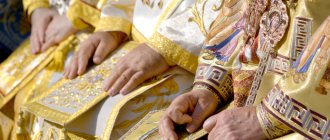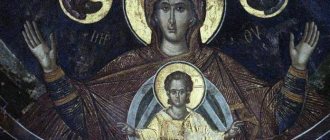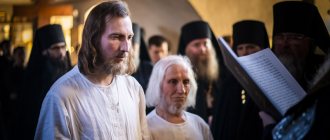What does obedience mean?
Photo: Optina.ru
Theologians note that obedience is, in a sense, a creative process that each person must go through independently. His spiritual mentor can point out certain guidelines, but how to use these instructions depends on the Christian himself.
For this reason, obedience is divided into right and wrong. Correct obedience is spoken of when a person clearly understands what exactly the mentor wants from him. Moreover, he follows all the recommendations exactly and lives up to the expectations placed on him.
If the instructions are taken too literally and there is a lack of common sense and initiative, then such obedience is incorrect. For example, zealously believing parents bring their newborns to confess and receive communion during the service on Easter night. This is an absurd and unnecessary zeal. You shouldn’t disturb a baby at that age at night, when he still has no sins.
This is a purely formal approach to the issue of obedience. Moreover, often such a person, if he is entrusted with something truly useful, but requires some effort, will find a lot of reasons not to do it.
Russian Orthodox Church
The report of Abbess Domnika (Korobeinikova), abbess of the Alexander Nevsky Novo-Tikhvin Monastery in the city of Yekaterinburg, was presented at a meeting of abbots and abbesses of monasteries of the Russian Orthodox Church, held on October 8-9, 2014 at the Holy Trinity Lavra of St. Sergius.
The topic of my report is “Obedience as the main virtue in monastic life.”
One book contains such inspirational words. What is a monastery? The monastery is the holiest place, higher than Sinai and Tabor. As St. Basil the Great writes, there is no similarity to him in anything “earthly. There remains only one similarity - the heavenly one" [1]. How is the monastery superior to the world? Because in it people live, like angels, in chastity, in the praise of God, unanimity and love. And, of course, the highest dignity of monastic life, incomprehensible to the world, is obedience. Just as Moses took off his shoes before the bush on Sinai, so the monks, figuratively speaking, take off their old shoes, that is, they put aside their old will in order to put on the shoes of the will of the Lord and follow the Lord [2]. Obedience helps them free themselves from all internal bonds: passions, infirmities, selfishness, worldly wisdom - and in spiritual freedom strive towards the commandments of God, towards the Kingdom of Heaven. Obedience mysteriously bestows the Holy Spirit on monks and initiates a life of grace in them. Finally, through obedience they become like Christ Himself. And it is not for nothing that every person who enters monastic life is called a novice and seals his self-denial with a vow during tonsure.
But what is true obedience? What meaning do the holy fathers put into this word? Obedience is obviously not a matter of discipline. He has different goals and character. While discipline only ensures order in society, obedience brings a person into a living relationship with Christ. Discipline is only the external subordination of one person to another for the sake of some earthly goals. And obedience is a free search for the will of God, which elevates a person to the feat of renouncing his “I” and is the main reason for the transformation of his soul and holiness.
And a lot depends on what is instilled in the monastery: obedience or simple external submission. Will the brotherhood live and develop, prosper in prayer and all virtues? Will there be unity in it? All this cannot be achieved through discipline. According to Elder Sophrony (Sakharov), if a spirit of discipline appears in a monastery, this is “a sure sign of a decline in monasticism” [3]. The laws that govern life in the world are not applicable to monasticism. A monastery is not just an institution, and the abbot is not a manager involved in administrative regulation. He carries out the ministry of reconciling a person with God, his relationship with the monks is of a sacred nature. And obedience in a monastery is not a management tool, but a sacrament in which the rebirth of a person by the Holy Spirit takes place. And if the abbot loves his monastery and wants to ensure its future, then the first thing he is called to do is to instill obedience in it.
What are the signs of obedience that distinguish it from discipline? A complete and detailed answer to this question can be found in the book “Teaching on Obedience” by St. Zosima (Verkhovsky), a Russian ascetic of the 19th century. He very accurately conveys the original tradition about this virtue, answering all questions that novices and spiritual mentors may have.
Firstly, the Monk Zosima says that obedience is based on trust, and when accepting brothers into the monastery, the abbot must see whether they are ready to completely trust him. Otherwise, the father and brothers will endure only troubles, sorrows and confusion from each other, and God knows whether they will be able to achieve their salvation [4]. If a monk does not have trust, then all the efforts of the abbot to lead him to God may be in vain, because for such a brother, according to Elder Zosima, “everything commanded by the father will be painful and unpleasant” [5]. For example, the abbot, seeing that his brother’s obedience is not useful, will transfer him to something else. The monk will outwardly obey, but in his soul he will harbor a grudge. And this will become an obstacle on his spiritual path. He will not be able to zealously fulfill the new obedience, nor will he sincerely obey his father in anything else, he will lose prayer, and will be jealous of the brothers whom the abbot supposedly loves more. And he will consider his entire monastic life a failure. If a monk does not love the abbot, does not trust him, then for him everything turns into difficulties and ends in tears. While for a monk who loves his spiritual father, the mountains turn into grains of sand! And the more a brother trusts the abbot, the easier the path of monastic life becomes for him, the faster he succeeds in prayer and all the virtues.
Of course, in order for the brethren to fully trust the abbot, it is important that the abbot, by his very life, inspires love and trust in them. In one monastic charter of the 5th century there is even a special clause about this: “The abbot should try to be loved more than to inspire fear” [6]. An interesting commentary on these words is given by Archimandrite Emilian, the pro-abbot of the Simonopetra monastery: “Monks should not make efforts to love the abbot, understand him, trust him... If the elder does not attract, does not inspire on his own, then what can the novices do? The situation in this case is very difficult. Of course, they will love their abbot in any case, because this is their duty for the sake of the name of God. But in order to love the unloved, they will experience the most difficult struggle, and life in the monastery will become a nightmare, languor. ... And therefore the abbot must inspire self-love. Then life in the monastery will be intertwined with the joy of Christ” [7].
In order to be loved by the brethren, the abbot does not have to have great talents. As Elder Emilian writes, “they love the abbot not for his talents, not for his holiness or wisdom, but because he is a father, an abbot, because in the monastery he represents the image of God” [8]. The sacrament of obedience differs from discipline precisely in that the brothers obey the abbot like children to their father, that is, with complete trust and tender love, and not as happens in a secular institution, where the elder orders, and the younger ones obey reluctantly or defending their rights.
The abbot is truly the father of the brotherhood when its management is inseparable from spiritual life, when he sensitively senses the spiritual state of the monks and strives to find his own approach to each. One book gives such an example. Imagine two monks. The first, if the abbot slaps him in the face, will be delighted: that’s how much the abbot loves him! And the second one is very vulnerable due to the fact that his parents treated him poorly; and he gets embarrassed at the slightest remark. And the abbot is called upon to correctly assess the strengths of each brother and take into account their character, upbringing, and weaknesses. As one elder says, the abbot is neither a ruler nor a road roller. He does not suppress the novice, but inspires him to voluntary, free obedience. The abbot builds relationships so that the monk always remains in intense spiritual feat, practicing every day in cutting off his will, and at the same time does not fall into despair if, due to weakness, he cannot fulfill the commands of his father. Caution in matters of health is especially important. Disagreement in this is one of the frequent reasons why a person loses trust in his spiritual father and even leaves the monastery. The abbot must subtly sense the line between when to be persistent and when it is better to condescend.
Often he is faced with very difficult spiritual tasks. How, for example, can one awaken the spirit of asceticism in brotherhood? How can such a brother, who constantly thinks about himself and strives for comfort, be taught self-sacrifice? How to inspire someone who asks for special clothing or food to live the gospel life? Or how to teach someone who requires special attention to himself to seek not human love, but the love of Christ? If you despise people's weaknesses, then you will not help them. The abbot is called upon to empathize with their suffering. He must understand them first, so that they can then understand him. And the main thing that the abbot needs in such cases is long-suffering. In theory, all monks are called to be patient, but in reality it is the abbot who has to be the most patient person in the brotherhood. After all, if monks are obliged to love and sacrifice themselves, then the abbot is even more obliged to love and sacrifice himself. And if he is like that, then he brings peace and reliability into the life of the monastery, and the brothers trust him and obey him with all their hearts.
At the same time, it is important that the monks themselves force themselves to trust the abbot. One Optina elder said: “As a person treats an elder, so the elder treats him” [9]. If a monk has openness and trust, then the heart of the spiritual father opens towards him. And even if the abbot is subject to passions and infirmities, for the sake of his novice he will be transformed. Feeling his responsibility, he will pray for his spiritual child, strive to help him, and he himself will grow in love and spiritual activity.
But what to do if a monk is still confused by thoughts of distrust of the abbot? It is important to understand that humility and abandonment of one’s will is not an easy matter. Obedience is the highest feat for a person with a fallen nature. And therefore, sometimes embarrassment, unwillingness to obey, and distrust are inevitable - even among people who are soft and meek in nature. And the abbot should encourage the monks, advising them not to be afraid of these thoughts, but to despise them. The life of St. Zosima tells of such an incident. The devil began to sow disgust for the elder in the heart of one of his novices. Ashamed to reveal this to him, she became increasingly despondent. Finally, she confessed to him: “Father, I don’t love you, I can’t even see you or hear your voice with indifference! I always feel annoyed and think: why does this guy live with us?” The elder admonished her with love that these were not her thoughts, but the enemy’s. She was appeased, but soon temptation rose again. This went on for more than a year: the sister cried and told the elder that she hated him, and he answered: “Be patient, be patient. You will have a martyr's crown unless you listen to the enemy. In fact, you love me. Otherwise, I would not cry and would not speak openly about my feelings, but would judge me with my sisters, would look for other mentors and would slander me to them. And you truly love me. May the Lord punish this sin of yours on me.” And the merciful God delivered the sister from temptation and gave her such devotion and faith in the elder that she served him even in his dying illness [10].
In this story I would like to note one important point. What helped the sister besides the patience and love of the elder? That she was frank with him. And this is the second condition of true obedience - frankness before the spiritual mentor. Unlike discipline, obedience is always accomplished in dialogue with the individual. And Elder Zosima advises his brother, who enters the monastery, to tell the abbot his whole life, “all his good and evil deeds committed from his youth” [11]. The abbot must help his brother open up so that he can see all his internal difficulties, understand why they occur and, most importantly, how they can be overcome. After all, if a brother does not tell everything and is left alone with his problems, embarrassment and thoughts, then later, due to internal disorder, he will begin to look for some false, wrong solutions. For example, he will fill the time with idle talk. Or he will begin to seek solace in food. Or he will become carried away by external activities, indulging in vanity and distraction. Or vice versa, he will fall into apathy and pain. All this can be avoided if the novice is frank with his spiritual father.
According to Elder Zosima, if there is no frankness, then one cannot even say that a brother lives in obedience. “Such a brother lives on his own, and not under the leadership of his father” [12]. For example, a monk is silent about any of his embarrassment or sinful thoughts. And the abbot cannot help him in any way, even if he guesses about his problems. After all, the point is what kind of relationship the brother has with the abbot. His secrecy or frankness shows whether he has trust in his father, whether he is ready to do everything his father tells him. And if the novice does not have such an attitude, and the abbot reveals his thoughts, then the brother will inevitably be embarrassed and resist. It is necessary for him to voluntarily reveal his thoughts or sin. The mere fact that he will open up will already be a victory for him over his “I”.
In general, the desire to be frank reveals the correct spiritual structure of the novice, his very ability for monastic life. And Elder Zosima advises the abbot “with his favor to give the brothers boldness, so that they are free in the revelation of all their feelings and thoughts” [13]. Such communication with the abbot is a source of inspiration for the novices, so that they leave him with a cheerful spirit, ready to continue their feat for the sake of the Kingdom of Heaven.
Another property of obedience that distinguishes it from simple external submission is that obedience is done consciously, with faith, for the sake of God. As Elder Zosima writes, a monk should never obey “simply, without any thought,” that is, aimlessly and indifferently, becoming like “a quiet, meek animal without reason” [14].
The biography of Elder Ephraim of Katunak tells how one novice monk complained to him:
“I’m overcome by dark thoughts, and I don’t know how to deal with them.”
Elder Ephraim immediately understood the reason:
-Are you listening to your elder? - he asked.
- Yes, father. “Whatever the elder tells me, I do,” answered the monk.
- Yes, you obey like an animal! True obedience consists of doing what you are told out of love and zeal for God [15].
So, since the brother obeyed without living faith, not out of love for God, but only out of habit, he did not receive spiritual fruit. Obedience bears fruit when a monk does it with ardent zeal, with faith and the understanding that he is obeying for the sake of Christ. And the abbot inspires the brethren to such obedience when he approaches all issues spiritually. For example, a monk is often late for obedience. The abbot can tell him: “Child, your obedience is your gift to God. Try not to be late for a minute. From this it will be clear that you live in achievement, and not in relaxation.” And then the monk, without any coercion or punishment, will decide to do what is appropriate. Whereas ordinary authority compels, spiritual authority places the monk before God. And in this sense, we can say that in a monastery there should be no ordinary discipline that is not inspired by the desire for God. For example, a monk is told to bring a bucket of potatoes to the kitchen, and he is called upon to carry out this small task as entrusted to him by God, as bringing grace and sanctification. Thus, the simplest work in the monastery and any monastic rules acquire a sacred and God-bearing character.
Obedience as a sacrament is characterized by one more property, inseparably connected with faith in its grace-filled power. Obedience is accomplished with inner freedom and a cheerful, joyful spirit. After all, if a person obeys for the sake of love for Christ, if he believes that through cutting off his will he is united with God, then he simply cannot fulfill obedience sluggishly and indifferently, as if under a stick.
Often novices, especially beginners, make this mistake. Trying to do exactly what they were told, they do not pay attention to the feeling with which they do it. But, as St. Zosima asserts, it is far from indifferent with what attitude the monk obeys. It depends on this whether the Lord will accept his obedience and whether it will bear good fruit [16]. And this is the main secret of obedience.
Let's give an example. The dean, on behalf of the abbot, asked the brethren to sweep the monastery courtyard. All the monks seem to be doing the same thing, everyone is obedient; but everyone has their own mood, their own thoughts. One, sweeping, is indignant that he was distracted from his main work, and out loud expresses his indignation. Another forces himself to work in silence, but he is frowning and internally upset. The third has a similar mood, but he realizes that this state of mind is wrong, sinful. And he internally reproaches himself, prays fervently and tries to work with zeal. Finally, the fourth monk works with sincere joy. He is internally free and at any moment ready to go wherever the abbot bless him. For him, every work in the monastery, as the holy fathers write, is great and worthy of heaven; in any place he zealously serves God and his brothers.
The Monk Zosima, considering in his book the different degrees of obedience, writes that a monk who obeys only outwardly, while maintaining dissatisfaction in his soul, is not pleasing to God. Only that obedience is according to God, which is done willingly, or at least with forcing oneself to sincere obedience [17].
Inner, heartfelt obedience is the basis of monastic life, one of the prerequisites for spiritual success. Even in ancient times, the Monk Hesychius of Jerusalem wrote: “It is fitting for us, who are in the community, to voluntarily and with a cheerful heart cut off all our will before the abbot” [18]. Cutting off your will is not so easy. So the monk showed outward obedience. But does his heart rejoice? Doesn't it express disagreement? Or maybe it responds to someone else’s will sluggishly, with sorrow, barely moving toward obedience? “This is not how our heart should be! - as if saying the Monk Hesychius. “Not lethargic and relaxed, but vigorous and alive!” A monk should not be like a dying man, he should be a warrior, a hero, including in obedience.
After all, when the holy fathers teach cutting off one’s will, this does not mean that a person should become weak-willed. By cutting off one's will we mean rejection of the sinful will. But the will that draws a person to God must be very strong. Bishop Athanasius of Limassol said in one of his conversations: “For example, when we talk about dispassion, we do not mean that a person should become insensitive. Impassive does not mean insensitive. A dispassionate person is one who loves very much, who wants only one thing in this life - the will of God. But he precisely wants the will of God.
I remember when I decided to go to the monastery, my mother said to me: “Does the Church teach such stubbornness?” Yes! When it comes to doing the will of God - of course! A person must resist sin with great strength. The life-giving spirit of the gospel is not a spirit of apathy. We are not dead creatures, not plants, but we are people, individuals endowed with a power that calls us to follow the will of God" [19].
And when a person has such a desire for God, then he does not need to be ordered. He himself is burning in spirit, he himself seeks obedience and with all his heart he listens to his spiritual father and all the brothers, every moment making sure that he does not fulfill his will.
However, the question arises: what should a monk do if he still feels internal resistance, an unwillingness to obey something? The Monk Hesychius answers this question. He writes that in the matter of obedience it is necessary to have a special, very subtle art, which consists in ensuring that a person “is not embarrassed by bile” [20]. Bile is bitterness, it is embarrassment when you have to do something that you don’t want at all. And most often it is these confusing thoughts, and not some external circumstances, that make the life of a monk fruitless. Without knowing how to “obey with art,” a person can spend many years in a monastery, but at the same time remain in passions, feel disappointment, and emptiness. Such a person comes to obedience and immediately comes into conflict with his neighbors. He wants to pray, but has no sympathy for the words of prayer, because his mind is constantly in restlessness, overwhelmed by a variety of thoughts. And very often the essence of all these spiritual problems is rooted in the fact that a person simply did not dare to surrender himself into obedience; he clings to his will, his desires, his selfishness. A person’s own will separates him from God, his spiritual father, and his brothers. Such a person is deprived of the main dignity of a monk - heartfelt obedience, and, one might say, falls from the heights of the monastic rank.
And the Monk Hesychius, revealing the secret of true obedience, calls on the monk “not to be embarrassed by bile,” that is, to immediately expel from the heart the bitterness that can arise when one needs to overcome one’s will. And Elder Zosima writes that, feeling grief from a command, a person should under no circumstances retain this feeling within himself [21]. He is called upon not to give up, not to give up, but to force himself to fulfill the command decisively, with prayer, trying with all his might to overcome grief. Such obedience can be equated to martyrdom, and it is always crowned with success. Only he remains without fruit who gives up the struggle, who falls into inaction, despairs and says: “I can’t do anything.” The one who works, who struggles, who steadfastly resists his desires in his heart with prayer, never fails. The grace of God certainly comes to him. And he feels that he is no longer upset, that his heart is filled with joy and love for obedience. And with each such case the monk becomes more and more freed from his will; it becomes easier and easier for him to obey. Because obedience is a matter of practice, and through constant practice in it, a monk can achieve perfect unity of his will with the will of God.
And such a monk is the happiest person. Just as a bird enjoys free flight into the sky, so a zealous novice enjoys obedience that takes him to heaven. And the job of the spiritual father is to always very carefully monitor how the monk obeys. If a brother experiences embarrassment that he cannot cope with, then we need to help him overcome it. Because if this grief accumulates, it will lead to despondency, which will eventually deplete the spiritual strength of the monk, so that he will not even be able to continue the monastic life. Although obedience is a feat, it is a feat that should fill the life of a monk with joy. The Monk Silouan of Athos once asked a monk, whom he always saw with a joyful face: “What are you happy about?” The monk replied: “All the brothers love me.” “Why do they love you?” - Elder Silouan asked again. “I obey everyone,” answered the monk. It was sincere, heartfelt obedience that brought him deep inner peace. As Elder Silouan wrote, “he found peace through obedience, which he did for the sake of God” [22].
I would also like to speak very briefly about one quality of obedience. True obedience is always coupled with prayer. One can say that the entire mysterious, spiritual life of a monk, connecting him with Christ, consists of two deeds - obedience to the abbot and prayer. And as the Monk Zosima taught, one activity is unthinkable without the other. Anyone who fails to obey his spiritual father cannot pray purely [23]. Likewise, one who weakens the sobriety of the mind and abandons prayer cannot maintain true, heartfelt obedience [24]. At the same time, the abbot himself does and says everything based on prayer experience, a prayerful attitude. And by teaching the monks two things - cutting off their will for the sake of Christ and unceasing prayer - he helps them achieve the main goal - so that their whole life becomes a stand before God.
And at the end of the report, I would like to recall a brief lesson said by one Athos abbot to his children: “Do you know why the Lord has gathered us here? So that we become saints. Then tell me: if we achieve anything but this, what do you think the result will be? Our monastery will be one of the legal entities, and not at all a sacred monastery, a place for the education of souls and the bosom of the Holy Trinity” [25]. And only when the sacrament of obedience is placed in the spiritual foundation of the monastery, such a monastery truly becomes a source of life for everyone who comes into contact with it. Because holiness is the norm of life in him and there is no longer in him what people all over the world suffer from: the search for primacy, envy, division. In such a monastery, no gloomy faces are visible, but joy reigns everywhere, God truly dwells and acts there. And it is precisely such a monastery that is capable of giving birth to new saints to the world.
1. Basil the Great, St. Ascetic charters. Ch. 18 // Basil the Great, St. Creations: in 2 volumes. M.: Sibirskaya blagozvonnitsa, 2009. T. 2. P. 354.
2. Translation from: Αἰμιλιανὸς Σιμωνοπετρίτης, ἀρχιμ. Λόγοι ἑορτίοι μυσταγωγικοί. Ἀθῆναι: Ἴνδικτος, 2014. Σ. thirty.
3. Sophrony (Sakharov), hieromon. On the foundations of Orthodox asceticism // Sophrony (Sakharov), hieromon. St. Silouan of Athos: Life, teaching and writings. Minsk: Rays of Sofia, 2005. P. 497.
4. See: Zosima Verkhovsky, St. Teaching about obedience // Sober Thought: in 2 volumes. Ekaterinburg: Novo-Tikhvin Convent; M.: Pilgrim, 2009. T. 1. P. 487.
5. Zosima Verkhovsky, St. Teaching about obedience // Sober Thought: in 2 volumes. Ekaterinburg: Novo-Tikhvin Convent; M.: Pilgrim, 2009. T. 1. P. 488.
6. Translation from: Αἰμιλιανὸς Σιμωνοπετρίτης, ἀρχιμ. Νηπτικὴ ζωὴ καὶ ἀσκητικοὶ κανόνες. Ἑρμηνεία στοὺς ὁσίους πατέρες Ἀντώνιο, Αὐγουστῖνο καὶ Μακάριο. Ἀθῆναι: Ἴνδικτος, 2011. Σ. 347.
7. Translation from: Αἰμιλιανὸς Σιμωνοπετρίτης, ἀρχιμ. Νηπτικὴ ζωὴ καὶ ἀσκητικοὶ κανόνες. Ἑρμηνεία στοὺς ὁσίους πατέρες Ἀντώνιο, Αὐγουστῖνο καὶ Μακάριο. Ἀθῆναι: Ἴνδικτος, 2011. Σ. 348–349.
8. Translation from: Αἰμιλιανὸς Σιμωνοπετρίτης, ἀρχιμ. Νηπτικὴ ζωὴ καὶ ἀσκητικοὶ κανόνες. Ἑρμηνεία στοὺς ὁσίους πατέρες Ἀντώνιο, Αὐγουστῖνο καὶ Μακάριο. Ἀθῆναι: Ἴνδικτος, 2011. Σ. 347.
9. Life of the Optina Elder Nektarios. Publishing house of the Holy Vvedenskaya Optina Hermitage, 1996. P. 16.
10. See: Elder Zosima Verkhovsky: Life and exploits. Sayings and extracts from his works: in 2 hours. Rep. playback ed. 1889. M.: Pilgrim, 1994. Part 2. pp. 14–15.
11. Zosima Verkhovsky, St. Teaching about obedience // Sober Thought: in 2 volumes. Ekaterinburg: Novo-Tikhvin Convent; M.: Pilgrim, 2009. T. 1. P. 487.
12. Zosima Verkhovsky, St. Teaching about obedience // Sober Thought: in 2 volumes. Ekaterinburg: Novo-Tikhvin Convent; M.: Pilgrim, 2009. T. 1. P. 488.
13. See: Zosima Verkhovsky, St. Teaching about obedience // Sober Thought: in 2 volumes. Ekaterinburg: Novo-Tikhvin Convent; M.: Pilgrim, 2009. T. 1. P. 525.
14. Zosima Verkhovsky, St. Teaching about obedience // Sober Thought: in 2 volumes. Ekaterinburg: Novo-Tikhvin Convent; M.: Pilgrim, 2009. T. 1. P. 513.
15. See: Joseph of Vatopedi, mon. Blessed novice. Biography of Elder Ephraim of Katunak. M.: publishing house of the Moscow Metochion of the Holy Trinity Sergius Lavra, 2004. P. 161.
16. See: Zosima Verkhovsky, St. Teaching about obedience // Sober Thought: in 2 volumes. Ekaterinburg: Novo-Tikhvin Convent; M.: Pilgrim, 2009. T. 1. P. 513.
17. See: Zosima Verkhovsky, St. Teaching about obedience // Sober Thought: in 2 volumes. Ekaterinburg: Novo-Tikhvin Convent; M.: Pilgrim, 2009. T. 1. P. 513.
18. See: Hesychia of the presbyter to Theodulus, a soul-helping and saving word, about sobriety and virtue, table of contents. [Ch.] 31 // Philokalia, or the Words and the main principles of sacred sobriety: in 2 volumes. M.: Sretensky Monastery, 2001. T. 1. P. 262.
19. Translation according to the electronic resource: https://www.omilies.net/2/2105_1HARETHTHSYPAKOHS.mp3.
20. See: Hesychia of the presbyter to Theodulus, a soul-helping and saving word, about sobriety and virtue, table of contents. [Ch.] 31 // Philokalia, or the words and main principles of sacred sobriety: in 2 volumes. M.: Sretensky Monastery, 2001. T. 1. P. 263.
21. See: Zosima Verkhovsky, St. Teaching about obedience // Sober Thought: in 2 volumes. Ekaterinburg: Novo-Tikhvin Convent; M.: Pilgrim, 2009. T. 1. P. 513.
22. Sophrony (Sakharov), schiarch. Elder Silouan of Athos. M.: Metochion of the Russian Monastery on Athos of St. Panteleimon, 1996. P. 405.
23. See: Zosima Verkhovsky, St. Teaching about obedience // Sober Thought: in 2 volumes. Ekaterinburg: Novo-Tikhvin Convent; M.: Pilgrim, 2009. T. 1. P. 606.
24. See: Zosima Verkhovsky, St. Teaching about obedience // Sober Thought: in 2 volumes. Ekaterinburg: Novo-Tikhvin Convent; M.: Pilgrim, 2009. T. 1. P. 591.
25. Emilian (Vafidis), archimandrite. Words and instructions. The seal is true. Life in the spirit. M.: Publishing house of the Church of the Holy Martyr Tatiana, 2006. P. 161
Synodal Department for Monasteries and Monasticism/ Patriarchia.ru
How does obedience in the family relate to obedience in Orthodoxy?
Photo: Culture.ru
They often talk about obedience in the family. However, it is wrong to assume that children are constantly in obedience to their parents. After the birth of a child, it is the parents who are in obedience to him, as they listen to his desires and concerns, this is the key to proper upbringing.
As children grow up, fathers and mothers begin to listen to them even more attentively. It is important for them to track what is happening in the child’s soul, especially in adolescence, in order to guide, give practical advice, and introduce him into the fold of the church in time. At the same time, the child must develop obedience in himself in order to follow these tips.
Everything works in a similar way in spiritual practice. The clergyman, like a doctor listening to the patient’s lungs, listens to the person in order to help him. But if the doctor identifies physical ailments, then the priest identifies mental problems. After the examination, the doctor writes out prescriptions and gives recommendations, and the priest gives advice on how to act to cope with a particular situation.
Having received these pieces of advice, the parishioner must be in obedience to his confessor, strictly following the instructions received from him.
Confidence
The Venerable John Climacus, speaking about obedience, puts its first condition in the presence of a “good person” who, “standing in the midst of action and vision, would raise his hands to God for us.” Obviously, betraying your conscience to another person is possible only if there is trust.
Close to us in terms of life, the ascetic of the 19th century, Ven. Zosima Verkhovsky († 1833) says that obedience is based on trust, and when accepting brothers into the monastery, the abbot must see whether they are ready to completely trust him and be frank with him. Otherwise, “breaking, disputes and all kinds of disagreement” will occur between the abbot and the brethren. Trust is the basis of our obedience. All human relationships are built on trust. We pray to God because we believe in Him and trust Him. Who do people choose as their life partner? Who becomes our friend? Only those whom we love and trust. Even business relationships cannot be built if there is no trust. When trust is lost, love cools down, friendships end, and business contacts fall apart. To obey means to trust, and therefore obedience is the greatest feat. He who renounces his will commits a feat of self-sacrifice. This is the trust the Son places in his Father. Isaac humbly ascends the altar, trusting his life to his father. Abraham raises a knife over his only son, trusting in God.
It is impossible, and indeed impossible, to demand a feat, one can only call for it. Consent to a feat must and can only be free. Obedience has moral value and exists in the field of moral relations in the same way as love, hope, and gratitude of a person. Such feelings cannot be reclaimed, because they are given as a gift and for free. Obedience should not be confused with submission and obedience. These three concepts have different natures and express different social and moral relations.
In the charter of St. Blessed Augustine, Bishop of Hippo († 430, commemorated June 15 (28)) says: “We must obey the abbot as a father and properly honor him, so as not to offend God in his person.” Elder Emilian Simonopetritus, commenting on this rule of St. father, o.
Why do they say that the Almighty is in obedience to man?
Photo: Elitsy.ru
Another fundamentally incorrect perception of obedience is to consider it any orders that are given in the church. If we are talking about relations between priests of different ranks, then they can be formalized in the form of circular letters. But this does not change at all the fact that all this is very far from true obedience.
The Orthodox Church declares that God himself is in obedience to man. This is actually true, because the Almighty constantly listens and hears us. If you know how to turn to the Lord with prayers, lead a righteous and decent life, then you will definitely be able to receive an answer to your every request and appeal. Therefore it is said that God is in obedience to man.
Obedience is a demonstration of our love and trust in God
Marina Korotenko , Master of Practical Theology from the Vision Institute of California, doctor, co-founder of the ministry “You Are Dear to Me.” Together with her husband Igor, they are senior pastors of the “Merefa Christian Church” (Ukraine).
How to be obedient to God every day? This seemingly simple question turns out to be not so simple. Every believer is familiar with the scripture verse “obedience is better than sacrifice” (1 Samuel 15-22). I think every person knows or has at least once heard about the tragedy that took place in the Garden of Eden due to people’s disobedience to God’s commandment. There are many wonderful sermons on the topic of how to acquire happiness and joy in life by becoming obedient to the Lord. So where does this question come from? Why is it so difficult to obey God every day?
There is a difference between the verbs KNOW and ACT. You can know what to do, or you can do as you know. Obedience to God is not a feeling, not a knowledge, it is a choice and a decision . Obedience is a demonstration of our love and trust in God. I don't think anyone would be delighted if they were shown love or trust only once a week. “Sunday trust” in God is not trust, and “Sunday obedience” to God is disobedience. It's hard to love every day someone you've heard about but don't know. You cannot trust someone with whom you do not have a faithful and sincere relationship. You can't listen to someone you don't trust.
To love God you need to know Him , to get to know Him you need to spend time with Him, share secrets with Him, ask for advice, find out His opinion. Every day our relationship with the one we love is built. Our relationship with God is built every day if we truly love Him.
Faith is, first of all, trust in love. One of the characteristics of love is faith (1 Cor. 13:7). It is very important not only who you believe in, but who you trust. This is why it is written: “Without faith [without trust] it is impossible to please God” (Heb. 11:6). The Apostle James asks us to show and demonstrate our faith (James 2:17-18).
If faith is trust, how can we show it by actions? OBEDIENCE – demonstrates our love and trust in God. Only on Sunday? No, every day! OBEDIENCE is also a daily test for us in which area of our life we do not yet trust God. Where there is no obedience, there is no trust and no love. Is this a reason for despondency, or is it a reason to deepen a relationship with God, a reason for change for the better. If you are not yet obedient to God every day, today is the day you can start. Today is the day of change, today is your day of love, trust and obedience.
Maxim Maximov , pastor of the New Life Church and president of the Christian satellite television channel CNL in Almaty, Kazakhstan, speaks on the topic: “Obedience or Sacrifice? How not to lose your relationship with God."
A little about the essence of the concept
Today we often hear the word “obedience.” But often we don’t fully understand what obedience is. It is assumed that this is the performance of some work in the monastery with the blessing of the abbot. But obedience is more viewed as the main component in spiritual monastic life and the main path to salvation in monasticism. This is perhaps the main definition of the term, which for the most part refers to monastic life.
The salvation of a person is impossible without obedience, he accepts the Sacrament of Baptism and thereby restores his nature, in the Sacrament of the Eucharist he unites with God, in the Sacrament of Repentance he becomes closer to the Almighty. The main goal for an Orthodox Christian is union with Christ, which can only happen by God’s will.
The more we obey Him, the more our love for Him increases
Steve Murrell , founder and pastor of Victory Church in Manila, Philippines, director of the Real Life Foundation, co-founder and president of Every Nation Churches & Ministries.
Often when I hear radio or television preachers, they seem to be teaching people to relax God's demands. I guess this means that our generation is producing the “least” in the kingdom.
The gospel teaches us that no matter how sinful and disobedient we are, God still loves and redeems us by grace through faith. Our obedience does not increase God's love for us, and our disobedience does not decrease His love for us. While we were still sinners, He loved us so much that He sacrificed His only Son for us.
If God loves us whether we obey or not, then what is the point of trying to obey His law?
The more we obey Him, the more our love for Him increases. Jesus said it this way: “If a man loves Me, he will keep My word” (John 14:23). He did not say that if anyone keeps My word, the Father will love Him. No, the Father loves us both when we keep the Word and when we don’t keep the Word. Reading and obeying God's Word increases our love for Him.
Nikolai Skopich , pastor of the Almaz Church in Kiev: “We have a weakness – leaving biblical truths in abstractions.”










